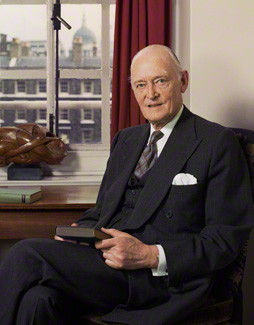
Gerald Austin Gardiner, Baron Gardiner, was a British Labour politician, who served as Lord High Chancellor of Great Britain from 1964 to 1970. In that position he embarked on a programme of reform, most importantly setting up the Law Commission in 1965.

HMS Glory (R62) was a Colossus-class aircraft carrier of the British Royal Navy laid down on 27 August 1942 by Harland and Wolff at Belfast. She was launched on 27 November 1943 by Lady Cynthia Brooke, wife of the Prime Minister of Northern Ireland.

Christ lag in Todes Banden, BWV 4, is a cantata for Easter by German composer Johann Sebastian Bach, one of his earliest church cantatas. It is agreed to be an early work partly for stylistic reasons and partly because there is evidence that it was probably written for a performance in 1707. Bach went on to complete many other works in the same genre, contributing complete cantata cycles for all occasions of the liturgical year. John Eliot Gardiner described it as Bach's "first-known attempt at painting narrative in music".
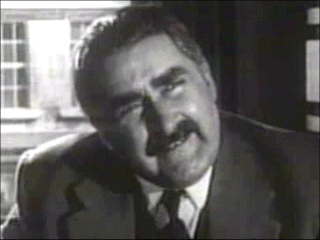
Francis Marie de Wolff was an English character actor. Large, bearded, and beetle-browed, he was often cast as villains in both film and television.

Robert Alfred Wolff was an American radio and television sportscaster.
HMS Kirkliston (M1157) was a Ton-class minesweeper of the Royal Navy, built by Harland and Wolff and launched on 18 February 1954. In a brief episode from 1956 to 1960 she was temporarily renamed HMS Kilmorey and was assigned to the Ulster division Royal Naval Reserve (RNR).
Michael Blieden Wolff is an American jazz pianist, composer, and actor. He was the bandleader on The Arsenio Hall Show (1989–94).
Johann Sebastian Bach composed the church cantata Wär Gott nicht mit uns diese Zeit, BWV 14, in Leipzig in 1735 for the fourth Sunday after Epiphany and first performed it on 30 January 1735, a few weeks after his Christmas Oratorio. The cantata, in Bach's chorale cantata format, is based on Martin Luther's hymn "Wär Gott nicht mit uns diese Zeit". Its text paraphrases Psalm 124, focussing on the thought that the believers' life depends on God's help and is lost without it.
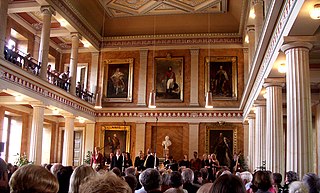
The Göttingen International Handel Festival is a German festival of baroque music, based in Göttingen, Germany. The festival was established in 1919 by Oskar Hagen, art historian and father of actress Uta Hagen, and gave its first performances in 1920. The festival has largely focused on the music of George Frideric Handel and has helped to revive and cultivate increased performances of Handel's music during the twentieth century. The festival involves professional musicians from throughout the world and their performances are largely concerned with employing historical baroque performance practices.

The R boats were a group of small naval vessels built as minesweepers for the Kriegsmarine before and during the Second World War. They were used for several purposes during the war, and were also used post-war by the German Mine Sweeping Administration for clearing naval mines.

Jesus nahm zu sich die Zwölfe, BWV 22, is a church cantata by Johann Sebastian Bach composed for Quinquagesima, the last Sunday before Lent. Bach composed it as an audition piece for the position of Thomaskantor in Leipzig and first performed it there on 7 February 1723.
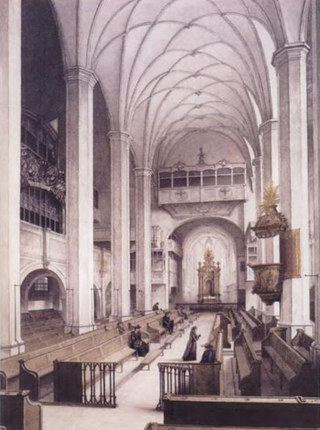
Johann Sebastian Bach composed the church cantata Ein ungefärbt Gemüte, BWV 24 in Leipzig for the fourth Sunday after Trinity and first performed it on 20 June 1723. It is the third new cantata of his first cantata cycle in Leipzig. The title has been translated more freely, for example as "An unstained mind", "An unblemished conscience", "An undisguised intention", and "An unsophisticated mind".

O ewiges Feuer, o Ursprung der Liebe, BWV 34, is a church cantata by Johann Sebastian Bach. He composed it in Leipzig for Pentecost Sunday, and it was the basis for a later wedding cantata, BWV 34a, beginning with the same line. Bach led the first performance on 1 June 1727.

Wer da gläubet und getauft wird, BWV 37, is a cantata by Johann Sebastian Bach, a church cantata for the feast of the Ascension of Jesus. Bach composed it in Leipzig and first performed it on 18 May 1724.

Johann Sebastian Bach composed the church cantata Schwingt freudig euch empor, BWV 36, in Leipzig in 1731 for the first Sunday in Advent. He drew on material from previous congratulatory cantatas, beginning with Schwingt freudig euch empor, BWV 36c (1725). The Gospel for the Sunday was the Entry into Jerusalem, thus the mood of the secular work matched "the people's jubilant shouts of Hosanna". In a unique structure in Bach's cantatas, he interpolated four movements derived from the former works with four stanzas from two important Advent hymns, to add liturgical focus, three from Luther's "Nun komm, der Heiden Heiland" and one from Nicolai's "Wie schön leuchtet der Morgenstern". He first performed the cantata in its final form of two parts, eight movements, on 2 December 1731.
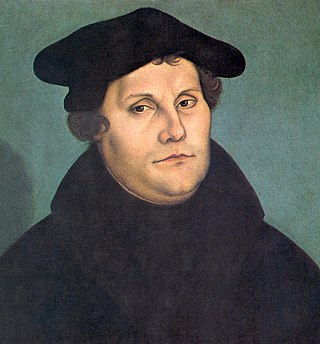
Johann Sebastian Bach composed the church cantata Nun komm, der Heiden Heiland, BWV 62, in Leipzig for the first Sunday in Advent and first performed it on 3 December 1724. The chorale cantata is based on Martin Luther's Advent hymn "Nun komm, der Heiden Heiland". It is part of his chorale cantata cycle.

Erschallet, ihr Lieder, erklinget, ihr Saiten!, BWV 172, is a church cantata by Johann Sebastian Bach, composed in Weimar for Pentecost Sunday in 1714. Bach led the first performance on 20 May 1714 in the Schlosskirche, the court chapel in the ducal Schloss. Erschallet, ihr Lieder is an early work in a genre to which he later contributed complete cantata cycles for all occasions of the liturgical year.

Johann Sebastian Bach composed the church cantata Komm, du süße Todesstunde, BWV 161, in Weimar for the 16th Sunday after Trinity, probably first performed on 27 September 1716.

Christen, ätzet diesen Tag, BWV 63, is a church cantata by Johann Sebastian Bach. He composed the Christmas cantata for the First Day of Christmas, possibly in 1713 for the Liebfrauenkirche in Halle. He performed it again for his first Christmas as Thomaskantor in Leipzig, on 25 December 1723.

O heilges Geist- und Wasserbad, BWV 165, is a church cantata by Johann Sebastian Bach. He composed it in Weimar for Trinity Sunday and led the first performance on 16 June 1715.














